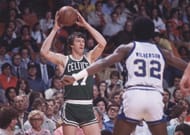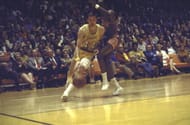5) Elgin Baylor
The man credited with being the first to transform the game from being horizontal to vertical, Baylor blew people’s minds with his aerial abilities in the late 50s and early 60s and was a gifted scorer and rebounder of the game.
He played his entire career with Minneapolis and later the Los Angeles Lakers.
He played in 11 All Star Games, was named to the All NBA First Team an incredible 10 times, and had some of the most eye-popping statistics and averages ever. Shockingly, Baylor never won an MVP award and his team could never win a title, despite playing in eight Finals!
Explore the NBA Draft 2024 with our free NBA Mock Draft Simulator & be the GM of your favorite NBA team.
Baylor retired in 1971, the same year his Lakers finally broke their Finals losing streak, winning a title without him!
4) Scottie Pippen
When the game’s greatest ever player Michael Jordan began his Hall of Fame speech, the first person he named was the person who was beside Jordan for all his moments of success: Scottie Pippen. One of the game’s greatest ever forwards, particularly on the defensive end, Pippen understood his role perfectly by Jordan’s side and helped the Bulls win six championships in the 90s.
Pippen was a jack of all trades, and while playing next to Jordan (who won five MVP trophies) kept him MVP-less, he came closest to the individual accolade in 1993-94, averaging 22-8.7-5.6 in Jordan’s absence. Pippen played in seven All Star games, was in the All NBA First Team three times, and also enjoyed a significant stint later in his career with the Trailblazers.
3) John Havlicek
How’s this for a glittering array of achievements: 16 seasons, eight championships, a Finals MVP award, 13 All Star appearances, four All NBA First Team appearances, and the honour of becoming the All Time leading scorer of the Boston Celtics, one of the NBA’s most storied franchises?
While Havlicek, or ‘Hondo’, won his first six titles next to Bill Russell in the Celtics’ greatest-ever era, it is the next two – in the mid-70s – that sealed his legacy. Team-mates like Russell (in the 60s) and Dave Cowens (in the 70s) took home the MVP trophies, but it was Hondo that outlasted them all to finish with more games under his belt in a Celtic jersey than any other.
2) Isiah Thomas
Before Allen Iverson and Derrick Rose, there was Isiah Thomas, the original small man to become a volume scorer and an inspirational leader from the guard position. But unlike the other two mentioned above, Thomas shockingly never won an MVP trophy.
Perhaps playing in an era where he shared his prime years between the likes of Larry Bird, Magic Johnson and Michael Jordan robbed Thomas of getting the shine he deserved.
But the leader of the ‘Bad Boy’ Pistons became a thorn in the side of everyone he played against; he led his underdog side to three NBA Finals and two titles, was the 1990 Finals MVP, played in 12 All Star games, and was in the All NBA First Team three times. He never won an MVP award, but he has the championships and the honour of being one of the greatest guards in the game’s history to make up for that let-down.
1) Jerry West
Jerry West, the Lakers legend, named his autobiography “My Charmed, Tormented Life”, and his NBA life certainly had some torments among its many charms.
Despite playing in 14 All Star games, getting named to 10 All NBA First Teams, leading the league in scoring and assists in different seasons, and leading the Lakers to an incredible nine NBA Finals in his 14-year career, West only won one NBA title (in 1972). He still holds the honour of being the only player to win Finals MVP in a losing team (1969).
And it goes without saying that he never won a regular season MVP trophy.
Still, West’s greatness can’t be defined solely by his silverware (or lack thereof). He was an All Star every year of his career and retired as one of the greatest guards in history. His ability to dominate at the biggest stage earned him the ‘Mr Clutch’ nickname, and his silhouette is still the model for the NBA’s logo.
Chicago Bulls Fan? Check out the latest Chicago Bulls depth chart, schedule, and roster updates all in one place.

